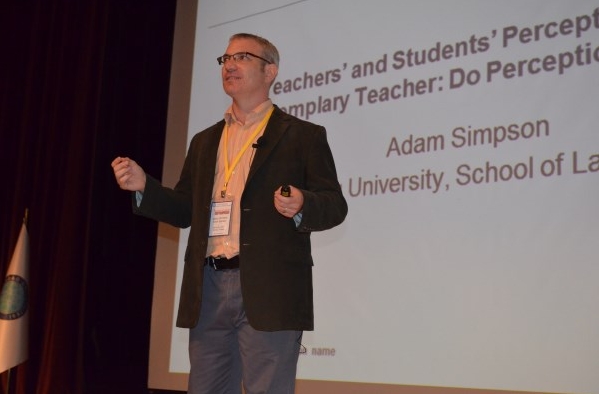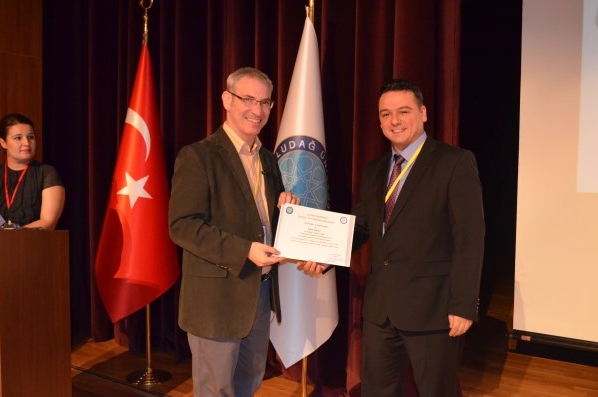Uludağ University’s International FLT Conference
 Uludağ University’s School of Foreign Languages held their first International FLT Conference
Uludağ University’s School of Foreign Languages held their first International FLT Conference
Adam Simpson
Uludağ University’s School of Foreign Languages held their first International FLT Conference on 26th April, 2014 in Bursa, Turkey. This one day event consisted of six plenary talks on a number of contemporary themes.
The cponference opened in some style with a highly practical plenary from the author, internationally famous keynote speaker and ELT trainer Paul Seligson, who joined us from Rio de Janeiro, Brazil. His talk, ‘My Favorite Ways to Use Song Lines’ noted how songs are perhaps our best listening activities: authentic, natural, motivating and fun. 28 years after last giving a talk on using songs, Paul returned to the subject, reflecting on whether we use the best techniques for incorporating songs in language learning. Among the issues he examined were; 1) finding a song that everyone in class; 2) the overly-long / overly-complicated nature of many songs; and 3) the restrictive nature of what he called ‘the rude bits’.
Associate Professor Zübeyde Sinem Genç, the head of the ELT Department at Uludağ University, presented ‘Content-Based Instruction at University Level: What EFL Teachers Should Know’. Noting the need for EFL instruction to offer more than just proficiency in the language, she went on to explain how this is not an easy thing to do. The talk therefore focused on the fundamentals of content-based instruction and hinted at how this may be implemented effectively.
Sabancı University School of Languages was represented by Adam Simpson, who delivered the day’s third plenary talk. Entitled ‘Teachers’ and Students’ Perceptions of the Exemplary Teacher: Do Perceptions Match?’ Adam’s talk asked the audience to consider this short dialogue:
Student 1: What did you get on your midterm?
Student 2: 80.
Student 1: Wow! How did you get so high?
Student 2: Our [English] teacher is really good.
The above is a dialogue that I heard between two students studying English at the School of Languages. One might have expected student 1 to ask the follow up question: "Why is your teacher so good?" or "What does your teacher do?" As no such question came, the students made no mention of their perception of the good teacher (except for the inference that we can make which is "A good teacher helps the student to get good marks"!). Nevertheless, this quick exchange highlighted the fact that at least one of the students had some thoughts about why their teacher was good. With this in mind, and with particular reference to the lack of elaboration on the part of the student in question, Adam, along with research partner Eylem Mengi, decided to conduct an investigation into what Turkish learners regard as good teaching of English.
The decision to also add teachers' conception of the good English teacher came about after seeing teachers' unease about the evaluation forms that students anonymously complete at the end of each semester. A fair share of teachers of English commented that students' perception of the good teacher did not really match the qualities that a good teacher actually has. Hence, this study aimed to explore both students’ and English teachers' conception of the traits and behaviour of the good teacher hoping that this would encourage teachers to 're-contemplate' their own teaching methodology and its impacts on students' learning processes, and, if necessary, make changes to their teaching to promote students' language competence and performance.

The event resumed in the afternoon with Steve Oakes, the head of teacher training at International House Budapest, Hungary and also known worldwide as the co-author of ‘Speak Out’. Steve’s ‘Embracing Ambiguity’ looked at the prevalence of authentic materials in ELT as a way of supplementing course books and the like. Noting that such use of materials often meet with resistance at lower levels, Steve sought to show us why and suggest ways of bringing about ‘ambiguity tolerance’ as an effective learner trait.
Associate Professor Esim Gürsoy, a faculty member of the ELT Department at Uludağ University, delivered ‘Teaching Children is No Child’s Play: Re-constructing Our Beliefs’. Looking at the comparatively recent phenomenon of teaching English to young learners, this talk examined practices from a Turkish perspective, looking at current requirements in schools and the types of skills that are being focused on at present.
The event concluded with a talk by Lynn Durrant, the head of training for young learners at International House Barcelona, Spain and specialist in CLIL. Her presentation, ‘Beyond CLIL (Content and Language Integrated Learning)’ look at ways to take CLIL further. Asking what we might do to focus more on cognition and commitment, the talk discussed ways of getting learners to think and take responsibility for their own learning environment.
